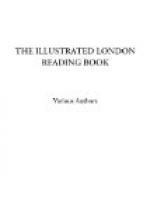The Egyptian mangouste is a native of North Africa, and was deified for its services by the ancient Egyptians. Snakes, lizards, birds, crocodiles newly hatched, and especially the eggs of crocodiles, constitute its food. It is a fierce and daring animal, and glides with sparkling eyes towards its prey, which it follows with snake-like progression; often it watches patiently for hours together, in one spot, waiting the appearance of a mouse, rat, or snake, from its lurking-place. In a state of domestication it is gentle and affectionate, and never wanders from the house or returns to an independent existence; but it makes itself familiar with every part of the premises, exploring every hole and corner, inquisitively peeping into boxes and vessels of all kinds, and watching every movement or operation.
[Illustration: THE MANGOUSTE.]
The Indian mangouste is much less than the Egyptian, and of a beautiful freckled gray. It is not more remarkable for its graceful form and action, than for the display of its singular instinct for hunting for and stealing eggs, from which it takes the name of egg-breaker. Mr. Bennett, in his account of one of the mangoustes kept in the Tower, says, that on one occasion it killed no fewer than a dozen full-grown rats, which were loosened to it in a room sixteen feet square, in less than a minute and a half.
Another species of the mangouste, found in the island of Java, inhabiting the large teak forests, is greatly admired by the natives for its agility. It attacks and kills serpents with excessive boldness. It is very expert in burrowing in the ground, which process it employs ingeniously in the pursuit of rats. It possesses great natural sagacity, and, from the peculiarities of its character, it willingly seeks the protection of man. It is easily tamed, and in its domestic state is very docile and attached to its master, whom it follows like a dog; it is fond of caresses, and frequently places itself erect on its hind legs, regarding every thing that passes with great attention. It is of a very restless disposition, and always carries its food to the most retired place to consume it, and is very cleanly in its habits; but it is exclusively carnivorous and destructive to poultry, employing great artifice in surprising chickens.
* * * * *
CULLODEN.
[Illustration: Letter C.]
Culloden Moor—the battle-field—lies eastward about a mile from Culloden House. After an hour’s climbing up the heathy brae, through a scattered plantation of young trees, clambering over stone dykes, and jumping over moorland rills and springs, oozing from the black turf and streaking its sombre surface with stripes of green, we found ourselves on the table-land of the moor—a broad, bare level, garnished with a few black huts, and patches of scanty oats, won by patient industry from the waste. We should premise, however, that




